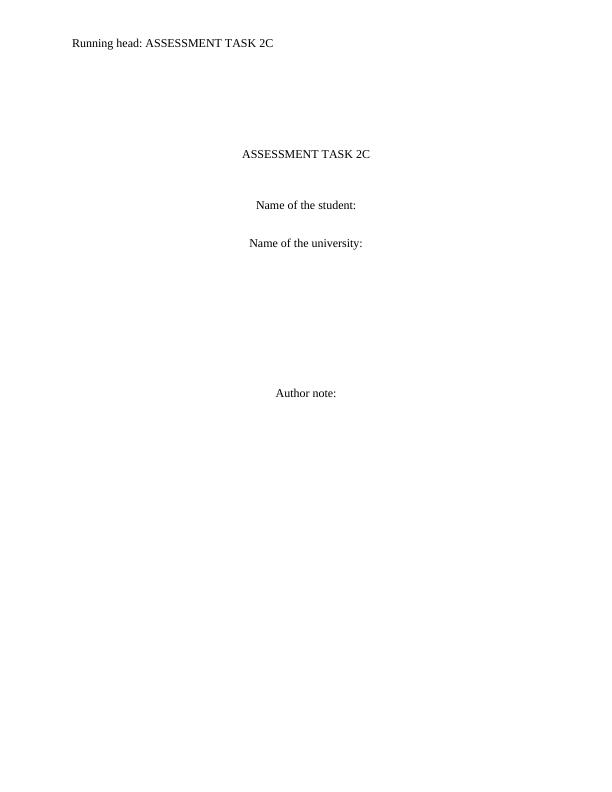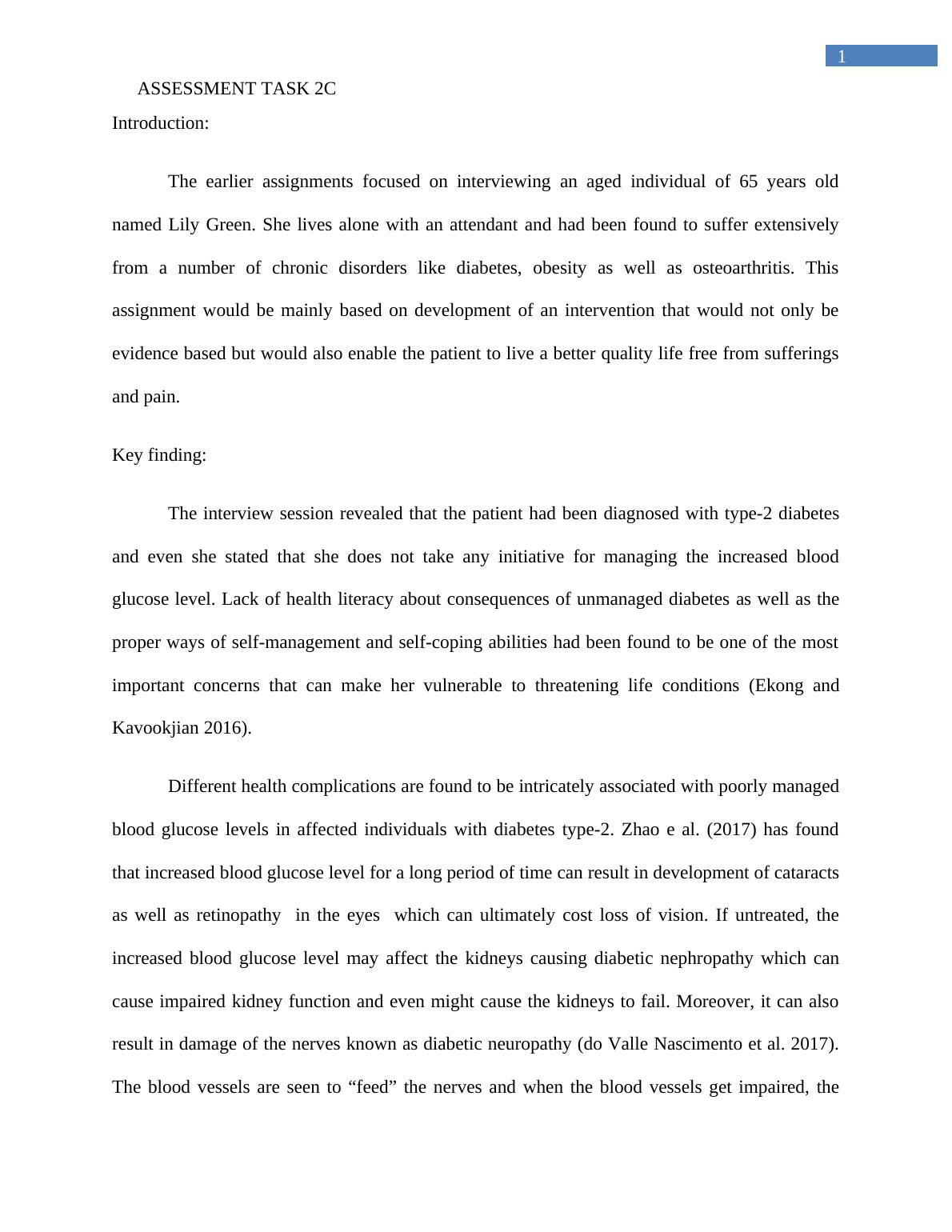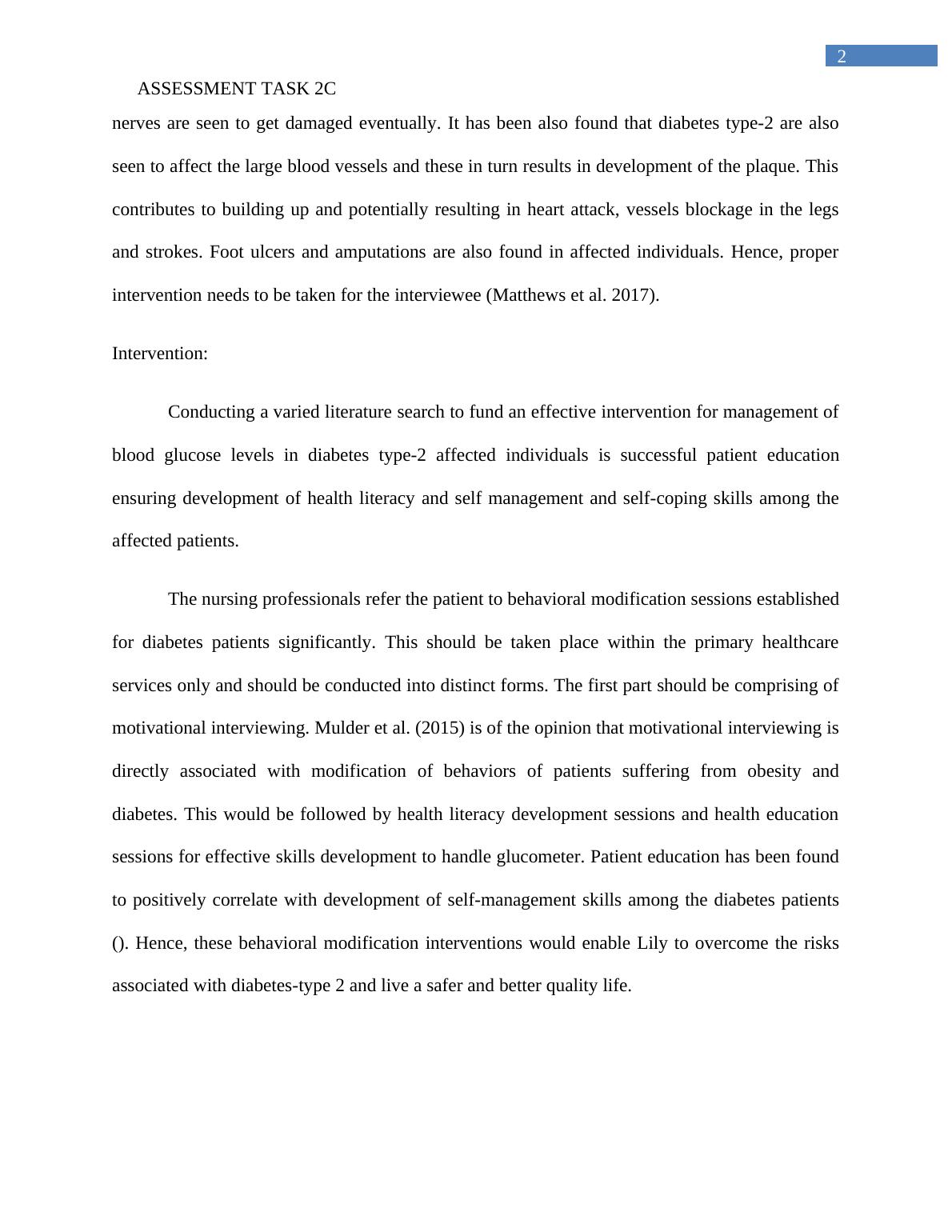Intervention for Managing Blood Glucose Levels in Diabetes Type-2
Added on 2022-11-26
8 Pages1774 Words286 Views
Running head: ASSESSMENT TASK 2C
ASSESSMENT TASK 2C
Name of the student:
Name of the university:
Author note:
ASSESSMENT TASK 2C
Name of the student:
Name of the university:
Author note:

1
ASSESSMENT TASK 2C
Introduction:
The earlier assignments focused on interviewing an aged individual of 65 years old
named Lily Green. She lives alone with an attendant and had been found to suffer extensively
from a number of chronic disorders like diabetes, obesity as well as osteoarthritis. This
assignment would be mainly based on development of an intervention that would not only be
evidence based but would also enable the patient to live a better quality life free from sufferings
and pain.
Key finding:
The interview session revealed that the patient had been diagnosed with type-2 diabetes
and even she stated that she does not take any initiative for managing the increased blood
glucose level. Lack of health literacy about consequences of unmanaged diabetes as well as the
proper ways of self-management and self-coping abilities had been found to be one of the most
important concerns that can make her vulnerable to threatening life conditions (Ekong and
Kavookjian 2016).
Different health complications are found to be intricately associated with poorly managed
blood glucose levels in affected individuals with diabetes type-2. Zhao e al. (2017) has found
that increased blood glucose level for a long period of time can result in development of cataracts
as well as retinopathy in the eyes which can ultimately cost loss of vision. If untreated, the
increased blood glucose level may affect the kidneys causing diabetic nephropathy which can
cause impaired kidney function and even might cause the kidneys to fail. Moreover, it can also
result in damage of the nerves known as diabetic neuropathy (do Valle Nascimento et al. 2017).
The blood vessels are seen to “feed” the nerves and when the blood vessels get impaired, the
ASSESSMENT TASK 2C
Introduction:
The earlier assignments focused on interviewing an aged individual of 65 years old
named Lily Green. She lives alone with an attendant and had been found to suffer extensively
from a number of chronic disorders like diabetes, obesity as well as osteoarthritis. This
assignment would be mainly based on development of an intervention that would not only be
evidence based but would also enable the patient to live a better quality life free from sufferings
and pain.
Key finding:
The interview session revealed that the patient had been diagnosed with type-2 diabetes
and even she stated that she does not take any initiative for managing the increased blood
glucose level. Lack of health literacy about consequences of unmanaged diabetes as well as the
proper ways of self-management and self-coping abilities had been found to be one of the most
important concerns that can make her vulnerable to threatening life conditions (Ekong and
Kavookjian 2016).
Different health complications are found to be intricately associated with poorly managed
blood glucose levels in affected individuals with diabetes type-2. Zhao e al. (2017) has found
that increased blood glucose level for a long period of time can result in development of cataracts
as well as retinopathy in the eyes which can ultimately cost loss of vision. If untreated, the
increased blood glucose level may affect the kidneys causing diabetic nephropathy which can
cause impaired kidney function and even might cause the kidneys to fail. Moreover, it can also
result in damage of the nerves known as diabetic neuropathy (do Valle Nascimento et al. 2017).
The blood vessels are seen to “feed” the nerves and when the blood vessels get impaired, the

2
ASSESSMENT TASK 2C
nerves are seen to get damaged eventually. It has been also found that diabetes type-2 are also
seen to affect the large blood vessels and these in turn results in development of the plaque. This
contributes to building up and potentially resulting in heart attack, vessels blockage in the legs
and strokes. Foot ulcers and amputations are also found in affected individuals. Hence, proper
intervention needs to be taken for the interviewee (Matthews et al. 2017).
Intervention:
Conducting a varied literature search to fund an effective intervention for management of
blood glucose levels in diabetes type-2 affected individuals is successful patient education
ensuring development of health literacy and self management and self-coping skills among the
affected patients.
The nursing professionals refer the patient to behavioral modification sessions established
for diabetes patients significantly. This should be taken place within the primary healthcare
services only and should be conducted into distinct forms. The first part should be comprising of
motivational interviewing. Mulder et al. (2015) is of the opinion that motivational interviewing is
directly associated with modification of behaviors of patients suffering from obesity and
diabetes. This would be followed by health literacy development sessions and health education
sessions for effective skills development to handle glucometer. Patient education has been found
to positively correlate with development of self-management skills among the diabetes patients
(). Hence, these behavioral modification interventions would enable Lily to overcome the risks
associated with diabetes-type 2 and live a safer and better quality life.
ASSESSMENT TASK 2C
nerves are seen to get damaged eventually. It has been also found that diabetes type-2 are also
seen to affect the large blood vessels and these in turn results in development of the plaque. This
contributes to building up and potentially resulting in heart attack, vessels blockage in the legs
and strokes. Foot ulcers and amputations are also found in affected individuals. Hence, proper
intervention needs to be taken for the interviewee (Matthews et al. 2017).
Intervention:
Conducting a varied literature search to fund an effective intervention for management of
blood glucose levels in diabetes type-2 affected individuals is successful patient education
ensuring development of health literacy and self management and self-coping skills among the
affected patients.
The nursing professionals refer the patient to behavioral modification sessions established
for diabetes patients significantly. This should be taken place within the primary healthcare
services only and should be conducted into distinct forms. The first part should be comprising of
motivational interviewing. Mulder et al. (2015) is of the opinion that motivational interviewing is
directly associated with modification of behaviors of patients suffering from obesity and
diabetes. This would be followed by health literacy development sessions and health education
sessions for effective skills development to handle glucometer. Patient education has been found
to positively correlate with development of self-management skills among the diabetes patients
(). Hence, these behavioral modification interventions would enable Lily to overcome the risks
associated with diabetes-type 2 and live a safer and better quality life.

End of preview
Want to access all the pages? Upload your documents or become a member.
Related Documents
Case Study of Type 2 Diabeteslg...
|14
|4100
|76
Drug Therapy- Sharon Case Scenariolg...
|7
|2333
|48
Health Literacy Development through Provider-Patient Interaction on Diabeteslg...
|8
|1750
|270
Diabetes Type 2 and its Risk Factorslg...
|11
|974
|71
Chronic Kidney Disease Nursing Assignmentlg...
|3
|427
|48
Effects of Physical Exercise - PDFlg...
|10
|3007
|126